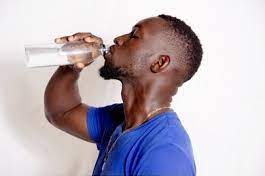Immediate Delivery
- 1-800-500-333-33
- Mon - Fri: 08.00 to 08.00
Why it’s important for you to drink water and stay hydrated
By Good Food Is Good Medicine
As the weather heats up this summer, you might be wondering what drink will keep you hydrated. Water allows you to stay hydrated and doesn’t contain unnecessary calories or additives. Our registered dietitian team shares why water is your best choice year-round.
Why should I drink water?
Water is vital to our health. It plays a key role in many of our body’s functions, including bringing nutrients to cells, getting rid of wastes, protecting joints and organs, and maintaining body temperature.
Water should almost always be your go-to beverage. Choose it over sugary drinks like soda or juice, which can be high in simple sugars and calories.
How much water should I drink?
The amount of water you should drink varies depending on your activity level, health conditions, height and weight, gender, and other factors. Here are some general guidelines, according to the Institute of Medicine:
- It’s recommended that men drink 13 cups (about 3 liters) of water each day.
- Women are recommended to drink 9 cups (just over 2 liters) of water each day. Pregnant women should drink 10 cups of water daily, and breastfeeding women should drink 12 cups.
- Kids and teens should drink 6 to 8 cups of water a day. Again, this all depends on activity level, age, weight, etc.
Eating fresh fruits and vegetables that are full of water helps with this daily water intake as well. For guidelines specific to you, ask your doctor or dietitian what they recommend.
Are sports drinks good for me when I’m exercising?
Sports drinks are advertised to increase endurance and replace nutrients lost during intense exercise. But are they necessary?
These drinks contain electrolytes like sodium, potassium, and calcium, as well as simple sugars (some may be sugar-free). However, these nutrients are generally only lost in large amounts during high-intensity exercise for one hour or more. Sports drinks may be useful for people doing intense exercise for a long time, especially if they’re sweating a lot. But for non-athletes, sports drinks are simply another sugary beverage.
Most people should drink water, not sports drinks, during their workouts.
Do caffeine drinks provide hydration?
Caffeine is found in drinks like coffee, some teas, energy drinks, and sodas. While you may urinate more after drinking a caffeinated drink, drinking these beverages does not cause you to lose more fluid than you consumed. However, caffeine can lead to headaches and trouble sleeping in some people.
Overall, water is your best bet to stay hydrated. It’s caffeine-free, calorie-free, and readily available for most people.
Is it ok to keep water in the car?
Before reaching for a plastic water bottle that’s been sitting in a hot car, think about how long it’s been in the heat.
When kept at high temperatures, the chemical bonds in plastic water bottles break down. This can increase the chance that chemicals get in the water. According to the U.S. Food and Drug Administration (FDA), this amount of chemicals is too small to cause health problems, but it can add up.
Keep bottled water at the same temperature as other groceries. Avoid leaving plastic bottles in a hot car during summer heat. Instead, put a water bottle in your bag or by the door, so you can remember to grab it on your way out.
Is it possible to drink too much water and overhydrate?
Most people are familiar with what dehydration is and how it happens. But is overhydration possible? Overhydrating happens when someone drinks large amounts of water, which can alter the levels of electrolytes in the body like chloride, sodium, and potassium. Not drinking enough fluid (dehydration) can lead to symptoms like thirst, flushing, fatigue, and fast breathing. In contrast, drinking too much fluid (overhydration) can cause nausea, headaches, cramps, weakness, and confusion.
For most people, dehydration is a greater risk. But if you are concerned about or having symptoms of overhydration, talk to your doctor. Ask your healthcare team about how much water you should drink each day.
Water is your best choice for health
You have many drink choices out there. At the end of the day, water is the first-choice beverage for best hydration. Drinking the right amount of water for your personal health and activity level is important. Try healthy add-ins like fresh mint, sliced cucumber, or lemon wedges to add flavor and variety to your water.


Leave A Comment